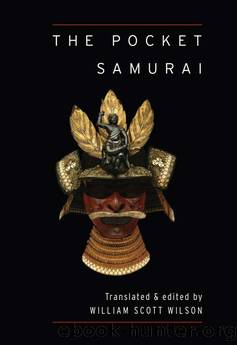The Pocket Samurai by William Scott Wilson

Author:William Scott Wilson
Language: eng
Format: epub
Publisher: Shambhala
9
Kaibara Ekiken
(1630–1714)
KAIBARA EKIKEN was one of the preeminent intellectuals of his time. A samurai who trained in the martial arts of the sword, bow, spear, and horsemanship, he was also a practicing physician and a lecturer on the philosophy of Confucianism. Ekiken was born in Fukuoka Castle on the southern island of Kyushu in 1630, thirty years after the history-altering battle at Sekigahara and eight years before the Shimabara Rebellion, the last significant conflict of the samurai era. Thus, although his paternal grandfather had performed meritorious deeds in battle while serving under Takeda Shingen and later as a samurai of the Kuroda clan, and his father and elder brother participated in the action at Shimabara, Ekiken himself would become a samurai of the new world of the Tokugawa shogunate—an era of peace in which the warrior had to adjust to a world without war. Ekiken would fare far better than others in this adjustment and become an ideal samurai of the new age.
Ekiken was a somewhat delicate child and was encouraged by his father, a physician, to study medicine and nutrition from the age of thirteen. From that time, he was taught both medicine and Confucian philosophy under the tutelage of his older brother Sonzai, for whom he had the greatest respect. Thus, from the very beginning, Ekiken studied medicine—caring for and curing the sick and ailing—and Confucianism, which places its highest value on human-heartedness, a principle that in great part means helping others. These associated values would guide Ekiken throughout his life, along with his great love and respect for nature, a legacy, perhaps, of his Shinto priest ancestors.
Ekiken’s curiosity about the world was insatiable, and along with his interest in Confucianism, he studied subjects as varied as botany, agriculture, topography, astronomy, the I Ching, zoology, linguistics, mathematics, and military science. He was also a prolific writer, somehow finding the time between his medical practice, lecturing, study, and travel to write over two hundred volumes.
To gain such extensive knowledge, Ekiken met, befriended, and engaged in friendly debate the greatest scholars of the day on a wide variety of subjects. He also took the time and had the interest to talk with the lower-class samurai, farmers, artisans, and people of the common classes in general, listening to their “most insane utterances” but never dismissing anything out of hand.
Ekiken was motivated by an altruistic love for all creatures and things and a desire to help them in a practical way. His wide range of studies focused more on jitsugaku, or “practical learning,” than simply on study for its own sake. In this way, a large number of his works were kun—“precepts” or “lessons”—on subjects as diverse as the proper understanding of what it means to be a warrior and how truly to be content and enjoy life. The work quoted here—the Yojokun (published in English as Cultivating Ch’i)—was compiled from a lifetime of observations of the deteriorating health of members of the samurai class and intended as practical advice on how they might live robust, long, and healthy lives.
Download
This site does not store any files on its server. We only index and link to content provided by other sites. Please contact the content providers to delete copyright contents if any and email us, we'll remove relevant links or contents immediately.
| Africa | Americas |
| Arctic & Antarctica | Asia |
| Australia & Oceania | Europe |
| Middle East | Russia |
| United States | World |
| Ancient Civilizations | Military |
| Historical Study & Educational Resources |
Wabi sabi by Kempton Beth(720)
Mr. Selden's Map of China by Timothy Brook(601)
Heroic Hindu Resistance To Muslim Invaders (636 AD to 1206 AD) by Sita Ram Goel(572)
Akbar: The Great Mughal by Ira Mukhoty(542)
The Meaning of India by Raja Rao(537)
Vedic Physics: Scientific Origin of Hinduism by Raja Ram Mohan Roy(535)
Banaras by Diana L. Eck(526)
Philippines--Culture Smart! by Culture Smart!(502)
Mao's Great Famine: The History of China's Most Devastating Catastrophe, 1958-1962 by Frank Dikötter(500)
Food of India by unknow(496)
China Unbound by Joanna Chiu(486)
How to Be a Modern Samurai by Antony Cummins(473)
India--Culture Smart! by Becky Stephen(472)
A History of Japan by R.H.P. Mason & J.G. Caiger(467)
Insurgency and Counterinsurgency by Jeremy Black(464)
North of South by Shiva Naipaul(460)
The Genius of China: 3,000 Years of Science, Discovery, and Invention by Robert Temple(446)
Kim Jong Un and the Bomb by Ankit Panda(430)
The Digital Silk Road by Jonathan E. Hillman(422)
